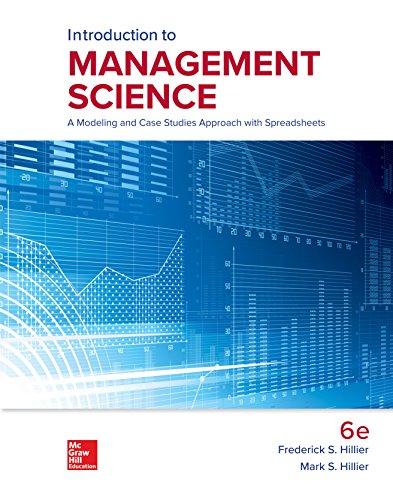Question
Imagine you are a department director with twenty-five employees reporting directly to you. Two of them are experts in their fields: You like and respect
Imagine you are a department director with twenty-five employees reporting directly to you. Two of them are experts in their fields: You like and respect them individually, as do the others in your department, but they simply cannot have a good relationship with each other and so never work together. You cannot simply insist that the two colleagues cooperate, because personalities do not change. Still, you must do your best to establish an atmosphere in which they can least collaborate civilly. Even though managers have no power to change human nature or the personality conflicts that inevitably occur, part of their responsibility is to establish a harmonious working environment, and others will judge you on the harmony you cultivate in your department.
Critical Thinking
- Choosing from our TEACH principles (Truthful, Effective, Accountable, Courageous, Humble), what do you believe is at the root of this conflict?
- How does this conflict impact other employees?
- What options would you use to foster a cooperative working relationship in your department?
- How do you resolve the conflict described above?
- Using what you have learned on this course, new policy that serves to guide employees on how they can contribute to a positive work environment.
Should You Act on Information?
Assume you are a partner in a successful computer consulting firm bidding for a contract with a large insurance company. Your chief rival is a firm that has usually offered services and prices similar to yours. However, from a new employee who used to work for that firm, you learn that it is unveiling a new competitive price structure and accelerated delivery dates, which will undercut the terms you had been prepared to offer the insurance company. Assume you have verified that the new employee is not in violation of any non-compete or nondisclosure agreement and therefore the information was not given to you illegally.
Critical Thinking
- Would you change prices and delivery dates to beat your rival, or would you inform both your rival and potential customer of what you have learned? Why?
- From #1 above, what would be the impact (positive or negative) on other employees if you chose that course of action?
- Choosing from our TEACH principles (Truthful, Effective, Accountable, Courageous, Humble), what do you believe is at the root of this conflict?
- What options would you use to foster positive working relationships in your department?
- Using what you have learned during this course, new policy that serves to guide employees on what to do in this situation.
Sexual Harassment or Just Bad Behavior?
Mary Ann Singleton was the librarian at a maximum-security prison located in Tazewell County, Virginia. About four times a week, Gene Shinault, assistant warden for operations, insistently complimented Singleton; stared at her breasts when he spoke to her; on one occasion, he measured the length of her skirt to judge its compliance with the prison's dress code and told her that it looked "real good"; constantly told her how attractive he found her; made references to his physical fitness, considering his advanced age; asked Singleton if he made her nervous (she answered "yes"); and repeatedly remarked to Singleton that if he had a wife as attractive as Singleton, he would not permit her to work in a prison facility around so many inmates.Shinault told Singleton's supervisor in her presence, "Look at her. I bet you have to spank her every day." The supervisor then laughed and said, "No. I probably should, but I don't." Shinault replied, "Well, I know I would." Shinault also had a security camera installed in her office in a way that permitted him to observe her as she worked. Singleton reported this behavior to her supervisor, who simply responded, "Boys will be boys." Singleton sued under Title VII.The Fourth Circuit Court of Appeals ruled that this behavior did not constitute sexual harassment. While boorish and offensive, it was not sexual in nature. Shinault never requested a sexual act, touched Singleton inappropriately, discussed sexual subjects, showed her obscene materials, told her vulgar jokes, or threatened her, Singleton did not allege that the complained of behavior interfered with her ability to perform her job. (2004 U.S. App. LEXIS 24059)
Critical Thinking
- Choosing from our TEACH principles (Truthful, Effective, Accountable, Courageous, Humble), what do you believe is at the root of this conflict?
- How does this conflict impact other employees?
- What options would you use to foster professional working relationships in your department?
- Assume you are Mary Ann's supervisor. What is your ethical obligation to protect her from this type of behavior?
- Using what you have learned throughout this course, new policy that serves to guide employees on how they can contribute to a positive work environment.
Step by Step Solution
There are 3 Steps involved in it
Step: 1

Get Instant Access to Expert-Tailored Solutions
See step-by-step solutions with expert insights and AI powered tools for academic success
Step: 2

Step: 3

Ace Your Homework with AI
Get the answers you need in no time with our AI-driven, step-by-step assistance
Get Started


